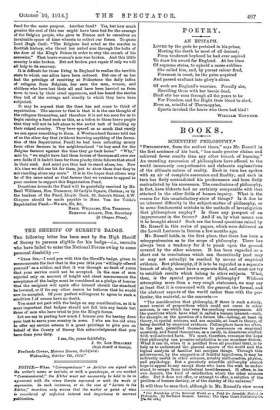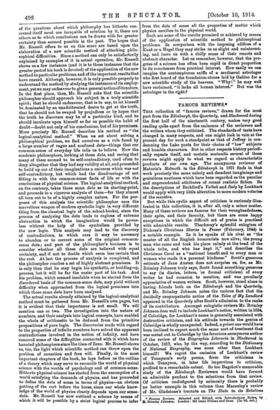BOOKS.
SCIENTIFIC PHILOSOPHY.* "PHILOSOPHY, from the earliest times," says Mr. Russell in the first sentence of his book, " has made greater claims and achieved fewer results than any other branch of learning." An unending succession of philosophers have offered to the world immensely comprehensive and elaborate explanations of the ultimate nature of reality. Each in turn has spoken
with an air of complete assurance and finality; and each in turn has flatly contradicted his predecessors and been flatly contradicted by his successors. The conclusions of philosophy, in fact, have hitherto had no certainty comparable with that attained in the other fields of human inquiry. What is the reason for this unsatisfactory state of things P Is it due to an inherent difficulty in the subject-matter of philosophy, or
to some fundamental mistake in the methods of investigation that philosophers employ P Is there any prospect of an improvement in the future? And if so, by what means can it be brought about ? Such are the broad questions raised by Mr. Russell in this series of papers, which were delivered as the Lowell Lectures in Boston a few months ago.
Mr. Russell holds, in the first place, that there has been a misapprehension as to the scope of philosophy. There has always been a tendency for it to poach upon the ground covered by the other sciences. It has been regarded as a short out to conclusions which can theoretically (and may or may not actually) be reached by means of empirical evidence. But philosophy, if it is to be regarded as a separate branch of study, must have a separate field, and must not try
to establish results which belong to other subjects. What, then, is the special province of philosophy P Without attempting more than a very rough statement, we may say at least that it is concerned with the general, the formal, and the abstract aspects of the world rather than with the par- ticular, the material, or the concrete :—
"The consideration that philosophy, if there is such a study, must consist of propositions which could not occur in other sciences, is one which has very far-reaching consequences. All the questions which have what is called a human interest—such, for example, as the question of a future life—belong, at least in theory, to special sciences, and are capable, at least in theory, of being decided by empirical evidence. Philosophers have too often, in the past, permitted themselves to pronounce on empirical questions, and found themselves, as a result, in disastrous conflict with well-attested facts. We must, therefore, renounce the hope that philosophy can promise satisfaction to our mundane desires. What it can do, when it is purified from all practical taint, is to help us to understand the general aspects of the world and the logical analysis of familiar but complex things. Through this achievement, by the suggestion of fruitful hypotheses, it may be indirectly useful in other sciences, notably mathematics, physics, and psychology. But a genuinely scientific philosophy cannot hope to appeal to any except those who have the wish to under- stand, to escape from intellectual bewilderment. It offers, in its own domain, the kind of satisfaction which the other sciences offer. But it does not offer, or attempt to offer, a solution of the problem of human destiny, or of the destiny of the universe."
It will thus be seen that, although in Mr. Russell's view some • Our Knowledge of the External World as a Field for Scientific Method in Phitosoyhy. By Be .rt•and Russell. London: The Open Court Publishing CO. [7i. ed. net.]
of the questions about which philosophy has hitherto con- cerned itself most are incapable of solution by it, there are others as to which conclusions can be drawn with far greater certainty than seemed possible in the past. The hopes that Mr. Russell offers to us on this score are based upon the elaboration of a new scientific method of attacking philo- sophical difficulties. Since a method can only be satisfactorily explained by examples of it in actual operation, Mr. Russell shows us a few instances (and it is to these instances that the greater partof his book is devoted) of the application of the new method to particular problems, and of the important results that have ensued. Although, however, it is only possible properly to understand the method by studying the instances of its employ- ment, yet we may endeavour to give a general notion of its nature. In the first place, then, Mr. Russell asks that the scientific philosopher should approach his subject in a truly scientific spirit; that he should endeavour, that is to say, to let himself be dominated by an unadulterated desire to get at the truth, that he should not be swayed by prejudices or by hopes that the truth he discovers may be of a particular kind, and he should inculcate upon himself so far as possible the habit of doubt—doubt not only of his conclusions, but of his premisses. More precisely Mr. Russell describes his method as " the logical-analytical method." When we set about solving a philosophical problem, we find ourselves as a rule faced by a large number of vague and confused data—things that our common-sense of everyday life tells us to believe. Now the academic philosophers, looking at these data, and seeing that many of them seemed to be self-contradictory, used often to deny altogether that they had any validity at all, and proceeded to build up out of their imaginations a universe which was not self-contradictory, but which had the disadvantage of not fitting in with the common-sense facts of life or with the conclusions of physical science. The logical-analytical method, on the contrary, takes these same data as its starting-point, and proceeds to a rigorous analysis of them—for they almost all turn out to be of a highly complex nature. For the pur- poses of this analysis the scientific philosopher uses the marvellous weapon of modern symbolic logic (a very different thing from the classical logic of the school-books), since the process of analysing the data leads to regions of extreme abstraction in which the imagination would be power- less without the help of the symbolism provided by the new logic. This analysis may lead to the discovery of contradictions, in which case it may be necessary to abandon or to correct some of the original common- sense data ; and part of the philosopher's business is to consider whether all these data are believed with equal certainty, and if not to decide which seem less certain than the rest. At last the process of analysis is completed, and the philosopher reaches a set of highly abstract premisses. It is only then that he may begin his synthetic, or building-up, process, but it will be far the easier part of his task. And his problem, which seemed insoluble when he started from the disordered basis of the common-sense data, may yield without difficulty when approached from the logical premisses into which those same data have been analysed.
The actual results already attained by the logical-analytical method must be gathered from Mr. Russell's own pages, but it is evident that their importance is not small. We will mention one or two. The investigation into the nature of numbers, and their analysis into logical concepts, have enabled the whole of arithmetic to be deduced from the primitive propositions of pure logic. The discoveries made with regard to the properties of infinite numbers have solved the apparent contradictions involved in the notion of infinity, and have removed some of the difficulties connected with it which have haunted philosophers since the time of Zeno. Mr. Russell shows us, too, the light which scientific method can throw upon the problem of causation and free will. Finally, in the most important chapters of the book, he lays before us the outline of a theory which may serve to reconcile the world of physical science with the worlds of psychology and of common-sense. Hitherto physical science has started from the assumption of a world satisfying the demands of physics, and has proceeded to define the data of sense in terms of physics—an obvious putting of the cart before the horse, since our whole know- ledge of the world of physics clearly depends upon our sense- data. Mr. Russell has now outlined a scheme by means of
which it will be possible by a strict logical process to infer Fantatu Reviews.
from the data of sense all the properties of matter which physics ascribes to the physical world.
Such are some of the results promised or achieved by means of the application of scientific method to philosophical problems. In comparison with the imposing edifices of a Kant or a Hegel they may strike us as slight and uninterest- ing, and leave us with a chilly sense of their remote and abstract character. Let us remember, however, that the pro- gress of a science has often been rapid in direct proportion to its remoteness from practical interest. How easily we can imagine the contemptuous sniffs of a mediaeval astrologer who first heard of the foundation-stones laid by Galileo for a new scientific study of the heavens. " Why!" he may well have exclaimed, "it lacks all human interest." But was the astrologer in the right



































 Previous page
Previous page